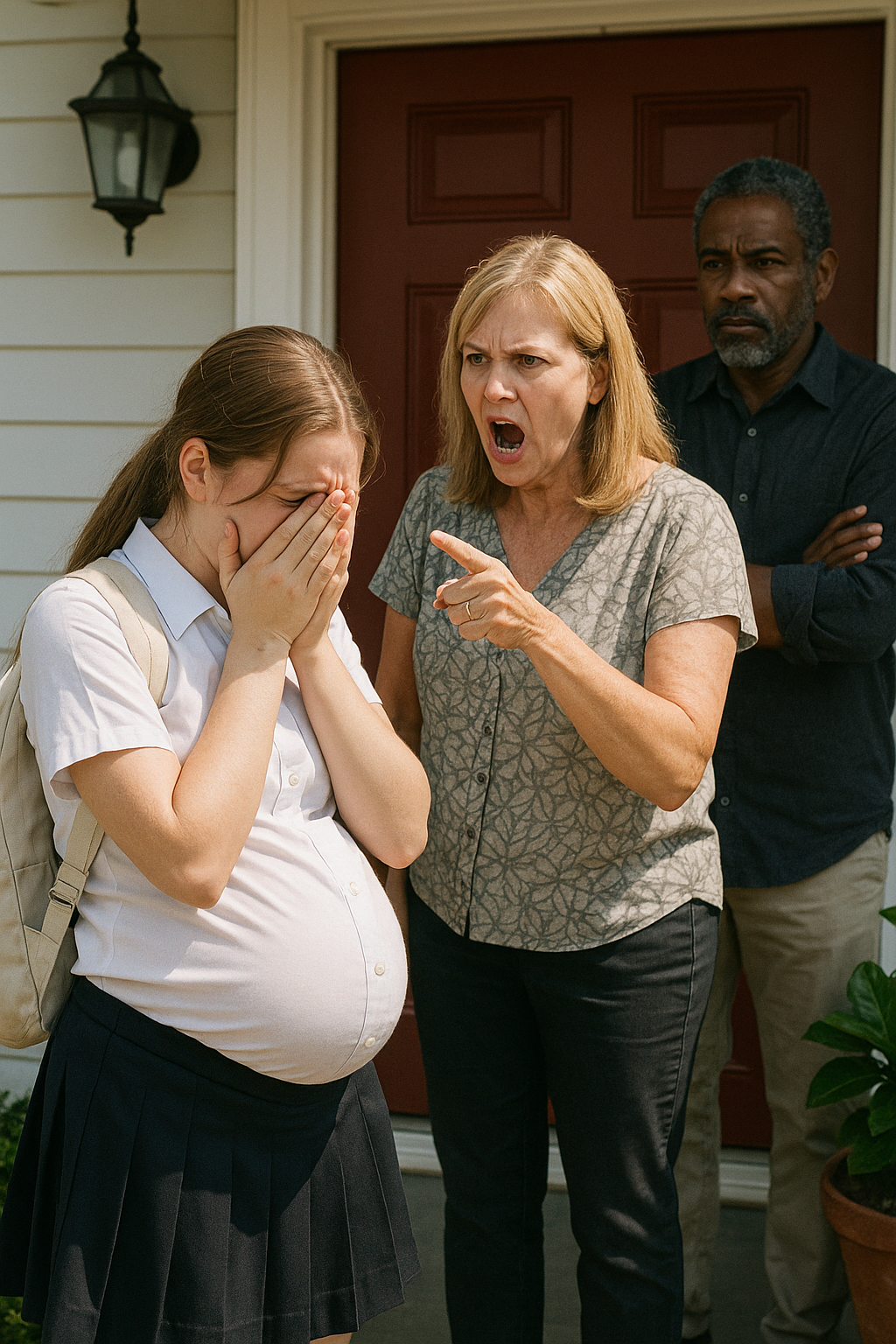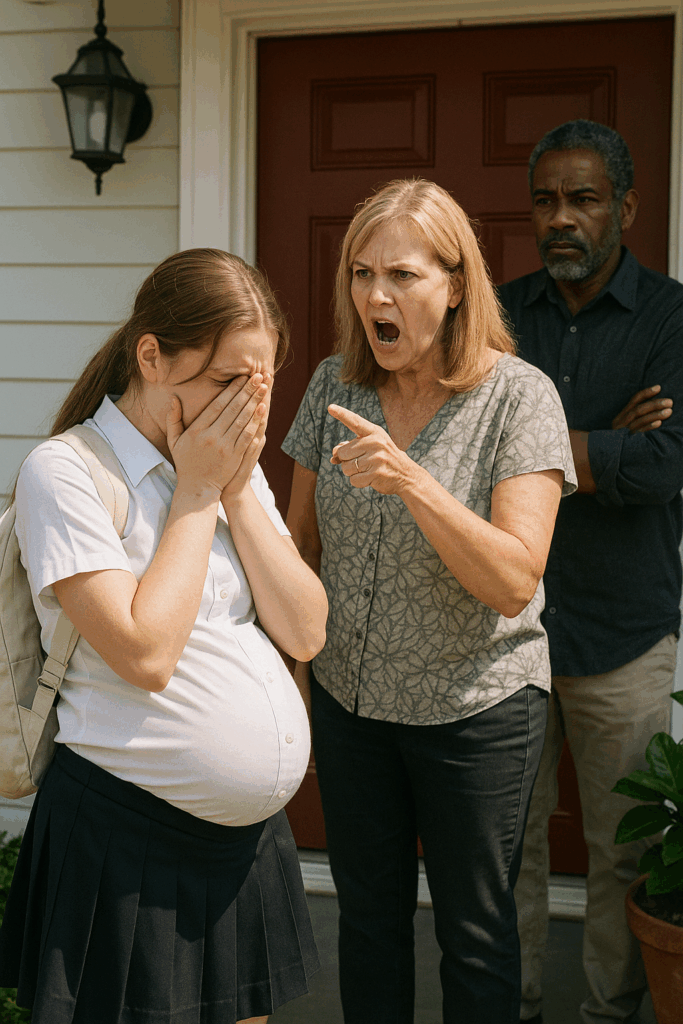The rain hadn’t stopped for days. It came down in sheets over the old Dawson farmhouse in Maple Ridge, Tennessee, turning the dirt road into a river of mud. On the porch stood a girl — fourteen years old, barefoot, her eyes swollen from crying. Her name was Sarah Dawson, and she was clutching a worn suitcase that wasn’t even hers.
“Please, Mama,” she whispered. “Please don’t do this.”
But the door cracked open just enough for her mother’s voice to slice through the night.
“You’ve brought shame on this family, Sarah. Don’t you dare come back.”
And then the door shut. Just like that — the sound of a life ending before it had even begun.
Sarah stood there for a long time, the rain plastering her hair to her face, her hands resting on the small swell of her belly. She wanted to scream. She wanted to run back and beg. But something inside her — something quiet and fierce — told her not to. So she turned away from the only home she’d ever known, stepped off the porch, and disappeared into the storm.
The Stranger at the Gas Station
Hours later, she found herself under the flickering light of a roadside gas station. Her sneakers squelched with every step. Her clothes clung to her like second skin. She sat on the curb, shaking, staring at the vending machine through the glass. That’s when a car pulled up — an old green Chevy. A woman stepped out. She had kind eyes and tired hands. Her name was Mary Whitaker, a nurse from the next town over.
“You okay, sweetheart?” she asked softly.
Sarah didn’t answer. She couldn’t. Mary took off her jacket and draped it over her shoulders. “Come on. Let’s get you warm.” That night, in Mary’s small apartment above a laundromat, Sarah slept for the first time in days. When she woke, she found a plate of scrambled eggs on the table — and a note that read:
“Stay as long as you need. You’re safe here.”
Sarah cried harder than she had the night she was cast out.

The Child and the Promise
When her baby was born that spring, Sarah named her Grace — because that’s what had saved them both. Grace came into the world small and fragile, her tiny hand wrapping around Sarah’s finger like she was holding on for life.
Sarah was still just a child herself, but when she looked at her daughter, something inside her settled. She made a promise then — whispered against Grace’s downy hair: “You will never feel unloved like I did.”
And she kept that promise with everything she had.
Days blurred into months, months into years. Sarah worked two jobs — cleaning rooms at a motel by day, waitressing by night. She studied whenever Grace slept, chasing her GED with exhausted eyes and stubborn hope. By nineteen, she’d earned it. By twenty-three, she was a licensed nurse — following in Mary’s footsteps. And by twenty-eight, she had a small home of her own — with a white fence, a garden, and laughter that filled every corner. Still, sometimes, when Grace was asleep, Sarah would stare at the ceiling and wonder if her mother ever thought of her.
If her brother Ben still lived in that farmhouse. If the porch light was ever left on.
The call came on a Wednesday evening. Grace was in her room doing homework when Sarah’s phone buzzed with an unfamiliar number.
“Hello?”
“Sarah.”
The voice was older, heavier — but she knew it instantly.
“Ben?” she breathed.
Her brother hadn’t spoken to her in fourteen years. He exhaled shakily. “You need to come home. Mom’s sick. The doctors say she doesn’t have long.”
Silence hung between them — thick, fragile, full of everything they hadn’t said. Sarah’s hand trembled. “Why are you calling me now?”
“Because she’s asking for you,” Ben said. “Every night. She thinks she’s seeing you at the door.”
Sarah’s throat tightened. The house that had cast her out was calling her back — not for forgiveness, but because it needed her.
The Return to Maple Ridge
Grace was fourteen now — the same age Sarah had been the night everything changed. When Sarah told her they were going to Maple Ridge, Grace looked confused.
“That’s where you grew up, right? Why haven’t we ever been there?”
Sarah hesitated. “Because some places… take time to face.”
The drive was long and quiet. The fields blurred past the window — the same fields she had run through barefoot as a girl, dreaming of anywhere else.
When they pulled up to the old Dawson farmhouse, Sarah’s chest constricted. The paint was peeling. The porch sagged. The wind chimes still hung where she remembered them. And there — standing in the doorway — was Ben. Older now. Gray at the temples. Eyes softer. For a long time, neither of them spoke. Then he said, voice thick, “You came.” She nodded. “I wasn’t sure I could.”
The Mother Who Forgot
Her mother was in a hospital bed by the window, her frame frail and her eyes clouded with time. At first, she didn’t recognize Sarah. The nurse whispered, “She has moments where she remembers. Talk to her.”
Sarah sat down, hands trembling.
“Hi, Mama.”
The woman’s gaze lifted, confused. “Who are you?”
Sarah swallowed hard. “It’s me. Your daughter.”
For a moment, nothing. Then — a flicker of something old, something real.
Tears welled in her mother’s eyes. “Sarah?”
Sarah nodded, unable to speak.
Her mother reached out a trembling hand, brushing her cheek.
“I thought… I thought you were gone.”
“No,” Sarah whispered. “You sent me away.”
Her mother’s lips quivered. “I did. God forgive me, I did.”
And for the first time in twenty years, Sarah let herself cry — not for what she lost, but for what she was finally ready to forgive.
The Secret Her Brother Kept
That night, after her mother fell asleep, Ben poured two cups of coffee at the kitchen table.
“I owe you the truth,” he said quietly.
Sarah frowned. “About what?”
“About that night.”
He looked down at his hands. “Mama didn’t want to send you away. It was Dad. He said he’d rather lose a daughter than have the church find out. She begged him to reconsider, but… you know how he was.”
Sarah’s eyes filled. “He made her say it.”
Ben nodded. “She cried for weeks after you left. When he died two years later, she said it was God’s punishment.”
Sarah’s breath caught. She didn’t know whether to feel relieved or heartbroken.
“She never stopped loving you, Sarah,” Ben whispered. “She just didn’t know how to show it.”
Later that night, Sarah walked out to the porch — the same place she’d been banished from all those years ago. Grace followed, her bare feet padding softly against the wood.
“Was this your house?” she asked.
Sarah nodded. “It was.”
Grace studied her. “Did Grandma really send you away?”
Sarah hesitated. “She thought she was doing what was right. But sometimes people get it wrong — even the ones who love you.”
Grace looked down. “I’m glad you didn’t.”
Sarah smiled through her tears. “Me too, sweetheart.”
They stood together in silence, the rain starting again — soft, cleansing, merciful.
Two weeks later, Sarah’s mother passed away peacefully, her hand in Sarah’s. Her last words were simple:
“You came back. You came home.”
At the funeral, the small town gathered — people who had once whispered behind closed doors, now watching the daughter who returned not as a shame, but as grace itself. After the service, Ben hugged her tightly. “She waited for you.”
Sarah smiled faintly. “And I waited for her.”
When Sarah went to clear out her mother’s room, she found an envelope tucked under the pillow. It was addressed to her, written in shaky handwriting.
“My Sarah,
I’ve carried my sin longer than I carried you.
I thought I was protecting you, but all I did was break both our hearts.
I prayed every night that you’d find kindness in a world that showed you none.
And when you didn’t come home, I knew you had — because you were strong enough to make your own home.
Forgive me if you can.
Love,
Mama.”
Sarah pressed the letter to her chest and closed her eyes. Forgiveness didn’t come easily. But it came.
Months later, Sarah and Grace stood by the garden Mary had once kept — now overgrown but full of wildflowers. Mary had passed years earlier, but her spirit lived on in everything Sarah had become.
Grace held her hand. “Are we going to stay here?”
Sarah smiled softly. “No, sweetheart. We’re going home.”
Grace frowned. “Where’s home?”
Sarah looked at her — really looked — and said, “Anywhere love lives.”
The Ending That Feels Like a Beginning
On the drive back to their small house, Grace fell asleep in the passenger seat, her hand still holding her mother’s. The rain cleared. The sun broke through the clouds — gentle and golden. And as the miles rolled by, Sarah thought about the fourteen-year-old girl who once walked away with nothing but a broken heart and a promise. She’d kept it.
Her daughter would never know that kind of loneliness. Her family, fractured and flawed, had finally found its way back — not through blood, but through forgiveness. That night, as Sarah tucked Grace into bed, she stood at the doorway for a long time, watching her sleep. So much peace in that small face — the peace she’d fought so hard to give. And for the first time in twenty years, Sarah whispered a question not out of pain, but out of wonder:
“If I hadn’t been cast out that night… would I have ever become the woman I am today?”
There was no answer. Only silence — soft, sacred, and finally kind.
Sometimes life breaks you to rebuild you. And sometimes, being cast out isn’t the end of your story — it’s where it truly begins.

